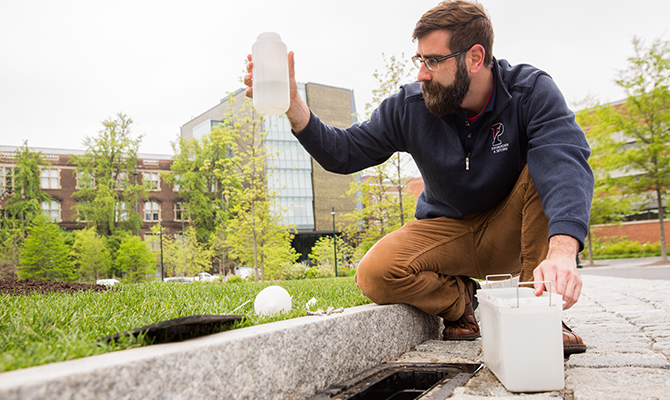Veterinarians are positioned to influence policies and practices that have direct impact on the environment. Trained to recognize the interdependency of animals, humans and environmental health—known as One Health—they are acutely aware of the effect environments have on animal health, as well as the effect animals, particularly livestock, have on the environment. Formal training in environmental studies allows veterinarians to lead and contribute to interprofessional teams that can advance innovative approaches to enhance environmental and agricultural sustainability, as well as global biodiversity—key challenges in our present and future. This dual degree program offers students an in-depth study of environmental problems and potential solutions directly related to animal and human health in a changing world.
About the program
Independently the MES is a 12 course unit degree and the VMD is a four-year degree program, consisting of a 2-year core course curriculum followed by 1.5-2 year clinical course curriculum—equivalent to approximately 64 credit units, including clinics. In this combined degree format, students complete 9 courses in the School of Arts and Sciences (SAS) and 3 courses that fulfill MES requirements during their VMD education. The VMD/MES student is in residence in SAS for up to 3 summer semesters of the dual degree program and in Penn Vet for 8 semesters.
- Of the 9 course units completed for the MES, Penn Vet will accept 3 course units at the graduate level toward their elective credits required for the VMD degree
- Of the credits completed in the VMD program, MES will accept 3 course units at the graduate level toward the 12 course units required for the MES degree
- This format reduces the typical residency for the two programs from 6 years to 5 years and reduces the total required course units from 76 to 70
- For a typical student, the dual degree residency for the two programs will be 10 semesters, although some students may be able to complete the two degrees in 9 semesters
Course sequence
| Full-time dual degree proposed timeline/sample course curriculum | ||
| Fall | Spring | Summer |
|---|---|---|
| Year 1 | ||
| Vet first year course curriculum | Vet first year course curriculum | 1 or 2 MES course(s) |
| Year 2 | ||
| Vet second year course curriculum | Vet second year course curriculum | 1 or 2 MES course(s) |
| Year 3 | ||
|
ENVS 601 3 MES Foundation courses |
2 MES courses ENVS 699 Capstone Seminar |
1 or 2 MES course(s) Capstone research |
| Year 4 | ||
|
Vet 3rd year clinic/electives Capstone research |
Vet 3rd year clinic/electives Capstone research |
Vet 4th year clinics/electives |
|
Year 5 |
||
|
Vet 4th year clinics/electives |
Vet 4th year clinics/electives |
|
Capstone requirement
The MES program requires a capstone while the VMD requires clinical work. For the dual degree, the capstone project will be related to veterinarian medicine and the environment and can be related to the student’s clinical work. This research should provide dual degree students with the opportunity to work in local, national, or international regions that grapple directly with challenges that influence the future of our planet.
Career opportunities
There are a wide variety of sectors where veterinarians with environmental interests and expertise are currently employed including international, federal, and state agencies, universities, and NGOs that recognize the interplay among animal, human, and environmental health and the growing importance of One Health approaches. Employers of veterinarians involved in wildlife and ecosystem health include federal and state agencies and laboratories, public and private universities, non-governmental organizations (NGOs), and zoos, aquaria, and marine and wildlife parks that may be publicly or privately operated. Careers may focus on diagnostics, basic and applied research, and/or stewardship activities, and educating veterinarians in fields that allow them to apply their medical training to address rapidly changing global needs—particularly those that take ecological health into account.
How to apply
Dual degree applicants must apply for and be accepted independently into each program. Applications for both VMD and MES will specifically request if the applicant intends to apply to the VMD/MES dual degree. However, Penn Vet students may apply to the MES degree and the dual degree program as late as the end of their second year. Applications are reviewed separately by the admissions committees for each program. Acceptance into one program of the dual degree does not guarantee acceptance into the other program. Once the student is admitted to both programs the dual degree program will be initiated.
See details about the MES application >
See details about the VMD application >
Contact information
MES program:
Siobhan Whadcoat, PhD, Director, Professional Masters Programs in Earth and Environmental Science
lps@sas.upenn.edu
VMD program:
Chipo Siantumbu
onehealth@vet.upenn.edu
Visit the Penn Vet website to get more details about the dual degree.





